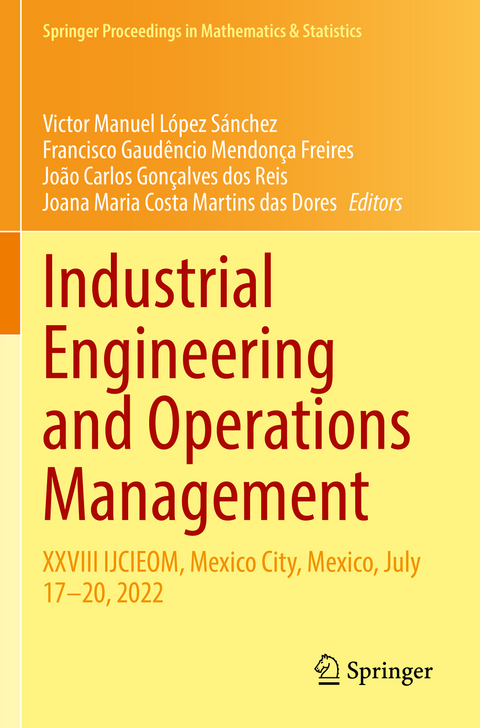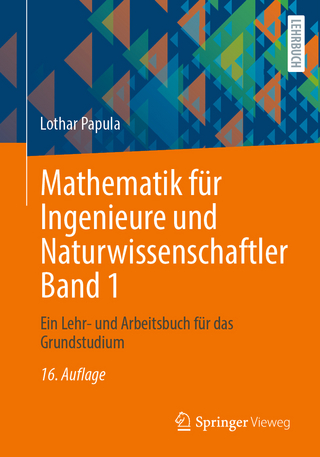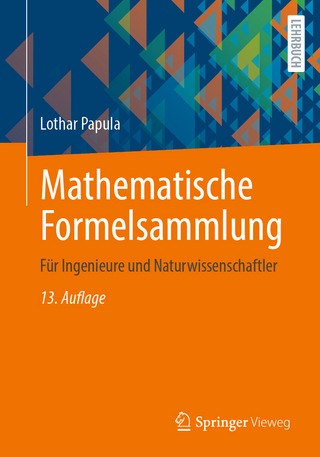
Industrial Engineering and Operations Management
Springer International Publishing (Verlag)
978-3-031-14765-4 (ISBN)
In this book, the reader will find works on topics as optimization models; stochastic optimization; digital transformation in the supply chain; data science applications in operations management; Industry 4.0: manufacturing planning & control; blockchain; intelligent transportation systems; sustainable and reverse logistics; big data and demand planning; predictive and prescriptive analytics; last-mile delivery optimization; stochastic inventory models; new trends in information technology for operation management; stochastic optimization; optimization models for omnichannel; safety in operation management; and more.
This volume includes relevant information for academics, since most of the chapters focus on real-world case studies and systematic reviews, but also for professionals in the industrial sector as it presents solutions to complex industrial challenges. Previous 2018, 2019, 2020, and 2021 IJCIEOM proceedings can also be found in Springer's catalog.
lt;b> Vi ctor Sa nchez is a professional in Supply Chain Management practices, such as Sales & Operations, Demand Planning, Master Scheduling, Shoop Floor Control, Capacity Planning, Lean management among others in telecommunications and automotive industry. He got a bachelor's in Industrial and Systems Engineering, an MBA degree, a PhD in Management at Tecnolo gico de Monterrey and has a 20-year experience as undergraduate and graduate professor in Supply Chain and Operations. He has served as professor in Engineering and Business Schools at Tecnolo gico de Monterrey (State of Mexico Campus and Mexico City Campus), also in MBA programs offered by Tecnolo gico de Monterrey at Guayaquil Ecuador, Lima Peru , Bogota , Medellin Colombia, Panama City, Panama, and in Engineering School at Universidad Ana huac Mexico. Victor has also been Director of MBA and Graduate Business programs at Tecnolo gico de Monterrey (State of Mexico Campus), Graduate and Working Adult Programs and Quality Assurance at Universidad del Valle de Mexico. Now he is the Managing Director of CADIT. (Center of Top Management in Engineering and Technology) at Universidad Ana huac Mexico, in the Engineering School and his research interest is in Supply Chain Management Process optimization
Francisco Freires holds a degree in Civil Engineering from the Federal University of Ceará (1996), a Master's degree in Production Engineering from the Federal University of Santa Catarina (2000) and a Ph.D. in Industrial Engineering and Management from the Faculty of Engineering of the University of Porto (2007). He has experience in Production Engineering with emphasis on Business Logistics and Operations Management, working mainly on the following topics: Supply Chain Management, Reverse Logistics, Sustainable SCM, and Cost Management. He was a professor at the Federal University of the São Francisco Valley (UNIVASF) until 2011. He researched the issue of logistics and supply chain management of biofuels and fruit growing in the northeastern semi-arid region of Brazil. He has also developed research in the advance of the intermodal logistics of the São Francisco River and reverse logistics systems for empty pesticide packings. He is currently an Associate Professor in the Department of Mechanical Engineering at the Federal University of Bahia (UFBA) Polytechnic School. He also works in the Graduate Program in Industrial Engineering (PEI) at UFBA, currently researching renewable energy alternatives from the perspective of Supply Chain Management and Circular Economy.
João Reis is a Professor at the Faculty of Engineering of the Lusófona University of Humanities and Technologies (ULHT), Lisbon, Portugal. He received his Doctoral Diploma in Industrial Engineering from Aveiro University in 2018. In recent years, he has been conducting scientific research in the fields of Service Science, Industrial Engineering and Operations Management. He is a research fellow at the Research Center on Industrial Engineering, Management and Sustainability (EIGeS) and at the Research Unit on Governance, Competitiveness and Public Policy (GOVCOPP).
Joana Costa - Post-Doc -"lnnovation Persistence and National lnnovation Contexts. The Role of Open lnnovation" Faculty of Economics, University of Porto; PhD on Public Policy - Innovation Policy on the University of Aveiro. MPhil in Economics from the Faculty of Economics, University of Porto; a Post-Graduate in Industrial Management, from the ISEP - School of Engineering; a degree in Economics from the School of Economics and Management, University of Minho. She is an Assistant Professor in the University of Aveiro, at the Department of Economics, Management Industrial Engineering and Tourism. She lectures PhD, graduated and under graduated courses of Econometrics, Applied Econometrics, Economics of Innovation, Entrepreneurship and Innovation, Public Finan
Eco-efficiency analysis of the Brazilian public transport based on data envelopment analysis (Oliveira).- Success factors in the application of lean and six-sigma methodologies to healthcare: A literature review (Ferreira).- Optimizing the chemical collection used in cork composites manufacture (L.P. Ferreira).- Impact of regulatory changes on the economic viability of photovoltaic systems in Brazil (Rigo).- Energy management maturity models: Literature review and classification (Monteiro).- Profitability analysis and commercial strategy in liquified petroleum gas distribution (Melo).- The triple bottom line in SSCM frameworks and their gaps in the period 2014-2022 (Ribeiro).- Applying lean tools to improve the performance of a small and medium-sized cutlery company (Macedo).- Digital transformation in the public sector: Enabling technologies and their impacts (Santos).- COVID-19 impact on ethanol sales in fuel stations: An ITS econometric analysis (Carvalho).- Lean maturity models: A scoping review (Simões).- Evaluation of radio frequency identification in hospitals operations (Ribeiro).- Opportunities for strengthening Brazilian plastic waste management adopting structural equation modeling (Pereira).- Use of QFD to prioritize requirements needed for supplier selection in an O&G project (A. Souza).- Consumer medicines disposal behavior: Insights towards a more sustainable chain (C. Kolling).- A model to estimate operator´s performance in accomplishing assembly tasks (F. Facchini).- Efficiency assessment of public transport ehicles using machine learning and non-parametric models (Kaiser).- MRO inventory demand forecast using support vector machine - A case study (P. Vidal).- A new solution to an old problem: inventory control with smart glasses (Rocha Junior).- A simplified approach to the process of design and development of technological products: Case study of a charpy type testing machine (Gasca).- E-waste reverse logistics for household products and its regulation: Advances in Brazil (Vargas).- Application of Heijunka for surgical production leveling (A. Souza).- Effects of the Sars-CoV-2 pandemic on the quality of work: Relations of effects on worker health (Melo Santos).- Consequences on supply chain performance in times of scarcity during a COVID-19 pandemic: A case study in an automotive industry (M. Sanches).- Technological Disruption in Grocery Retail: An overview of the last decade (2012-2021) (R. Rivera).- A network modeling and analysis of COVID-19 hospital patient data (Lopes).- University-Industry collaboration from the perspective of a spin-off: A case study (Nascimento).- GOAL-OKR: A framework for strategic focus using objectives & key results and theory of constraints (Kunrath).- Influence of the COVID-19 pandemic on purchasing behavior and the perception of shipping price and delivery time by Brazilian E-Shoppers (Nascimento).- The impacts of the COVID-19 pandemic on an educational institution´s administrative process, a process mining approach (Ferreira).- Circular business models: A multiple case study in manufacturing companies in northern Brazil (Bacovis).- Analysis of prospective scenarios: A study on educational REITS in Brazil (Hermogenes).- An analysis of different variable selection methods in the context of a banking institution (Juáre).
| Erscheinungsdatum | 24.11.2023 |
|---|---|
| Reihe/Serie | Springer Proceedings in Mathematics & Statistics |
| Zusatzinfo | XII, 432 p. |
| Verlagsort | Cham |
| Sprache | englisch |
| Maße | 155 x 235 mm |
| Gewicht | 676 g |
| Themenwelt | Mathematik / Informatik ► Mathematik ► Angewandte Mathematik |
| Wirtschaft ► Betriebswirtschaft / Management ► Unternehmensführung / Management | |
| Schlagworte | Blockchain • business • Data Science • Industrial Engineering • Industry 4.0 • Innovation • manufacturing planning and control • Operations Management • Optimization models • predictive analytics • Prescriptive Analytics • stochastic optimization |
| ISBN-10 | 3-031-14765-0 / 3031147650 |
| ISBN-13 | 978-3-031-14765-4 / 9783031147654 |
| Zustand | Neuware |
| Informationen gemäß Produktsicherheitsverordnung (GPSR) | |
| Haben Sie eine Frage zum Produkt? |
aus dem Bereich


